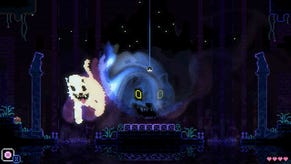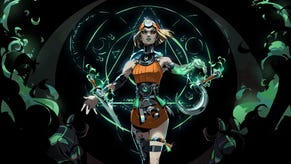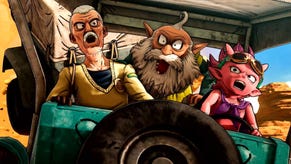As Dusk Falls review - a bold new future for interactive movie games
Dawn miss it.
Don't be put off by the unusual art style: As Dusk Falls is good. I'd even go as far as to say it's the best interactive movie game I've played, and in that breath I'm considering all of Supermassive's output (the Dark Pictures games, etc.), Flavourworks' Erica, Quantic Dream's stuff (there's a Quantic Dream link here by the way). And OK granted, this is not a massive sub-genre, but clearly more studios are getting involved and, as far as I'm concerned, that's a very good thing.
Just in case you don't know, interactive movie games are largely how they sound: the action mostly plays without you. Your input comes at major decision points when you're asked to make choices that dramatically change the story. It's no exaggeration to say characters will live and die based on the choices you make. Those are the big moments but there are smaller decisions too, building to them, and there are quick-time events to plug the gaps and keep you engaged along the way.
The magic of this formula is its ability to engage bystanders like movies do. People will shout things like, "No, don't do that!" And, "Run away!" and that kind of thing, unwittingly investing themselves in what's going on. The games are almost as fun to watch as they are to play.
As Dusk Falls takes this a step further by letting onlookers directly join the game with a controller or, via a companion app, with phones/tablets, and selecting what they think characters should do. The most popular choice wins. There's even Twitch support allowing viewers to do similar. I didn't get a chance to test the game with friends but I did play it via the companion app and it controlled fine. The app turns the phone into a giant touchpad, effectively.
But none of that is what makes As Dusk Falls good - it just makes it a certain type of game. What makes it good is how it delivers it. There's a real understanding here from developer Interior/Night about what makes games like these work.
Take the art style, for instance. It's unusual - it reminds me of photoreal comic strips from years ago that I always found too much like real-life to be excited by - and it's not fully animated, meaning, among other things, that characters' lips don't move when they talk. It takes a while to settle into but when you do, it's actually very effective.
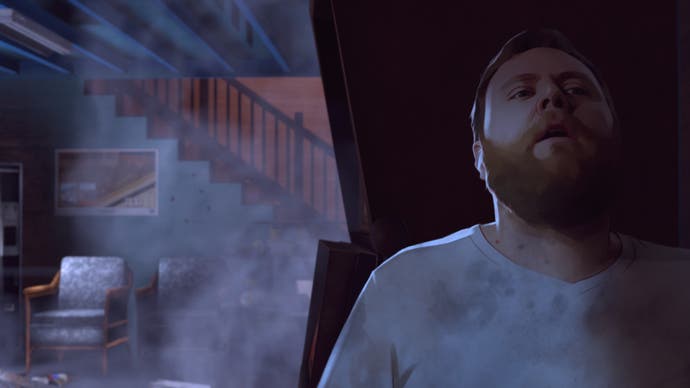
It's remarkable how only relying on a few key frames per scene manages to convey the same sense of drama and emotion as fully animating them. A key part of this is how well characters' expressions are captured. It might be a head thrown back over a shoulder to produce a loving look, or a distant stare as a character lapses into melancholy - whatever it is, you can clearly see it and understand it. They are the kind of images you can only create from close observation, and I had to dig into Ed's interview with Interior/Night boss Caroline Marchal (former lead designer of Heavy Rain and Beyond: Two Souls) to discover that that's exactly what happened here: the images were taken from live, captured performances and then painted over. It really works. Layer the audio and generally impressive voice work over the top and, once you stop looking for the lips to move, you forget there's anything missing.
What's so clever about this is it does away with all of the laborious, time-consuming and expensive animation work usually involved in making a game like this. There's no need to lip-sync, which has the happy side-effect of making the game very easy to localise in other languages (and there are many different language voice-overs included). It means the game is easier on hardware, too, running fine in 4K on Xbox Series S for me.
There's also a sense that by dodging the heavy cinematic workload, Interior/Night has saved more time and energy to focus on the things that really matter in a game like this: story and characters. After all, if we don't care about them, why should we care what happens on screen?
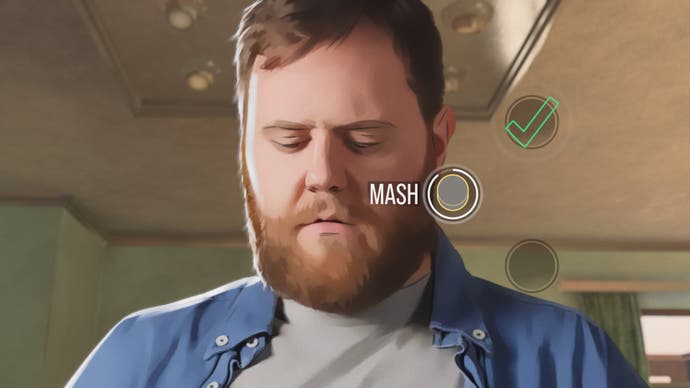
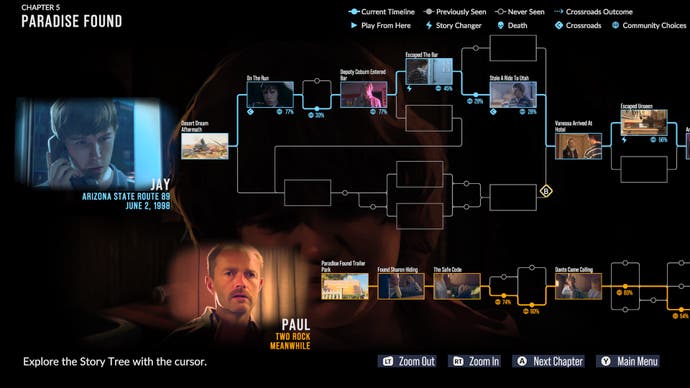
Broadly, the story follows two families who collide in a motel in small-town - tiny-town - Arizona. One is a family with a small child and old grandparent, on their way to a new home, and one is a family with a more troubled make-up. But what initially seems like a contained confrontation soon balloons into something much bigger that will spread over a larger area and many, many years.
It's in telling the story that As Dusk Falls really excels, taking the time to show and round almost every character we meet so we understand who they are and why they are doing the things they do. I've never seen another game like this go to these lengths, nor delve as deep and tackle the kinds of topics As Dusk Falls does. Ultimately, it's a game about humans and the turns real lives can take, a drama rather than a monster movie or a sci-fi adventure. That doesn't mean it's boring - it sure goes places, many more than I expected given the humdrum beginnings - just that it presents situations, extreme though they may be, from a relatable, human point of view. It's in this way the game takes on mental health issues and, fair warning, suicide (though this is clearly signposted and skippable) and never feels sensational doing so.
The game does this in a variety of ways. There's a storyline that plays out in the present, but there are also flashbacks that backfill many of the characters you meet. These are anchored on a few key playable characters, but pull the others in around them. Some flashbacks go back weeks, some go back years, and they all have the powerful effect of being able to completely upend your perspective of what's going on in the present timeline - and of broadening the game considerably.
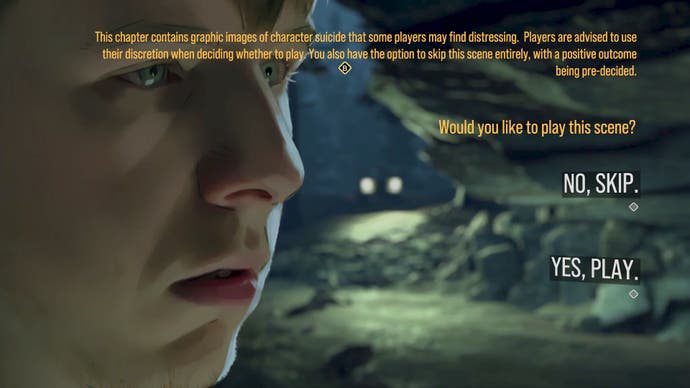
Who the goodies are and who the baddies are is a debate you'll spin around on constantly, and being able to play both sides of the equation makes for some brain-melting decisions. I sat there for minutes at a time chewing over the toughest ones, staring at them like doors into a future I wished I could see.
The bigger choices aren't timed but smaller ones are, in order to keep the pace and tension up. This is another area As Dusk Falls wields considerable skill in. The art direction helps by ridding the game of all the flabby in-between moments it doesn't need and, while there are moments you're given the freedom to look around an area - moving the cursor to highlight points of interest much like in a point-and-click game - you're never left alone for long. The pace never sags. There's always an appreciable sense of tension building, and there are some wonderful surprises during the climactic moments - I wrote "wow!" while taking notes a handful of times at events I didn't see coming; As Dusk Falls isn't afraid to go there. It's got more twists than a helter skelter.
"Silly as it sometimes can be, As Dusk Falls feels real"
It clearly takes a lot of inspiration from TV, breaking the game into chapters with attention-grabbing intros of their own, which recap and set you up for another evening's play. The chapters are then grouped into two 'books' that represent the two major timelines in the game. In all, it lasted me about six hours, but there's a clear appeal here for going around again to make different choices - the webs of choice and consequence are presented to you after every chapter, showing but not spoiling all the possibilities you missed.
As Dusk Falls represents a bold new future for interactive movie games - a future where games can do away with the supernatural spectacle and thrillery whodunnits to rely on human drama to entertain us instead. And OK, this does occasionally veer into soap opera, but at other times it's gentle and deep and dark, even profound. It shows how well games can handle stories and themes like these when done with care and understanding, and how well it can pull us into the lives of others and invest us in the decisions they have to make. And that's what really stays with me about the game: stories - human stories. They are the troubled, awkward and beautiful stories I can see in the world around me, that I can relate to myself. This is a game that reflects, in many ways, our own lives. Silly as it sometimes can be, As Dusk Falls feels real, and I can't think of a higher compliment to give it.
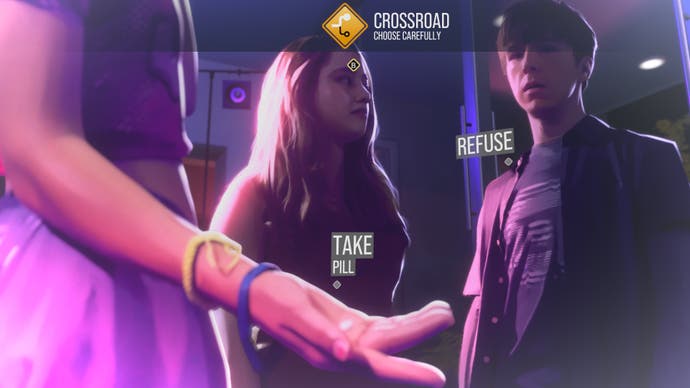




.png?width=291&height=164&fit=crop&quality=80&format=jpg&auto=webp)


